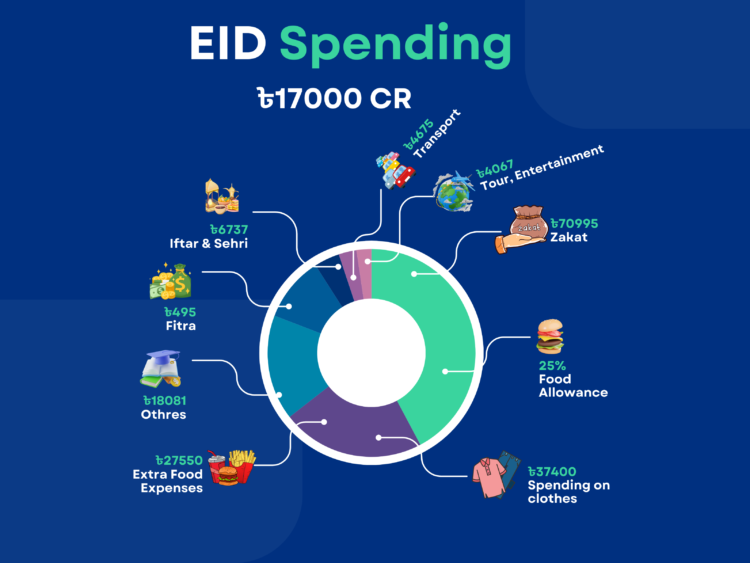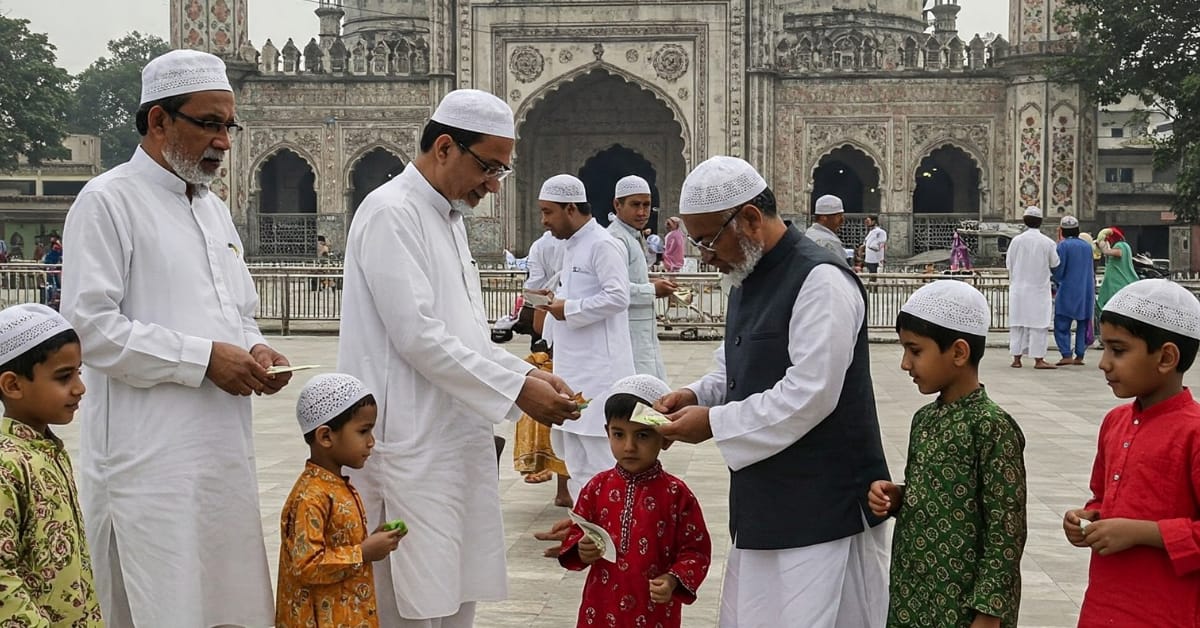Have you ever wondered where the idea of EID SALAMI came from? The tradition of Eid Salami is rooted in historical practices. The Fahmid Callphs used to distribute gifts in the 10th century AD as Eid Salami. On Eid day, scholars and Quran reciters would receive a special Eid gift of silver dirhams. Under the Mamluk Sultanate (1250-1517), rulers distributed money to buy clothes, which was known as “AL GAMKEYAA.” Iranis used to celebrate by giving sugar to each other as gifts. Fast forwarding to the present day, Salami is still exchanged between family, friends, and kin but it’s not limited to cash anymore. In recent years, Salami has significantly transitioned into digital form. Salami transitioned from Silver Dirham those days to digital money these days!
Eid Salami in Bangladeshi culture
The years of this tradition is known as the Eid Salami in a culture of Bangladesh where elders give cash to younger family as a blessing. Such practice is part of the social and family bonding and adds joy to children and strengthens relationships in family members. Sighting of new moon, new dress, Eid prayer, delicious food, loved ones being around you, and most importantly exchanging salami, concludes the joy of Eid. But, in addition to its cultural significance, Eid Salami performs a significant function within Bangladesh’s economy as a temporary financial stimulus ( a seasonal boost in consumer spending and liquidity).
Economic implications
Eid Salami is an informal way of exchanging millions of taka each year and impacting other economic activities.. For children and young adults, a regular amount of money will come, and most of them will spend this in shopping and other leisure activities that end up driving retail markets, shopping places, and online. With the arrival of digital financial services (DFS) like Bkash, Nagad and Rocket, increasing quantities of Eid Salami are now dispensed and used digitally, reinforcing Bangladesh’s fintech industry. Additionally, expatriate Bangladeshis send increased remittances during this period, positively impacting foreign currency reserves.
Impacts on Economic Activities, Inflation, Savings, and Business Growth
With Eid Salami comes a rush of cash that results in a spike across sectors. The sector, especially retail, sees the highest number of transactions, as almost Tk 170,000 crore worth of Ethiopian Ethiopian transactions are conducted in the Dhaka city before Eid-ul-Fitr, according to the Bangladesh Shop Owners Association (BSOA). Out of this amount, Tk 37,400 crore is for clothing purchases only. The food and beverage industry also experiences increased demand, as families make special meals to mark the occasion. Eid is usually followed by a surge in remittance inflows as a token of salami. Workers remitted $1.99 billion this month, which will also help the economy. In this context, the country’s largest provider of mobile financial services (MFS), bKash, has turned into the most common mode of trading salami in recent years. New way to celebrate Eid with ‘Eid er Chand Akashe, Salami Din bKash-a’ tagline. bKash ‘group send money’ feature is the unique option that permits users to send Salami to several recipients at once for added convenience and is part of wider trend of digitalization of money transfers in Bangladesh.

Modernization of Eid Salami
Eid Salami, another beloved practice in Bangladesh, is when elders give money to the younger members of the family as part of the Eid celebration. It is also a practice that signifies blessings and love and sharing joy through the generations. Traditionally, it has been a way to teach kids about giving back and the value of family ties.
The tradition of Eid Salami has changed with time; it has evolved with society, with technology. Fresh banknotes were traditionally carved for distribution on Eid. Yet, in light of recent events, including a ban on the issuance of new banknotes by the Bangladesh Bank in 2025, this practice has been disrupted. The rise of digital financial services also changed the way the Salami is traded. Companies providing mobile financial services such as bKash have introduced software enabling the payment of Salami digitally, a manifestation of the general trend of digitalisation of financial transactions. In modern culture, the bonus that the boss gives is known as a token of salami. In Bangladesh, as a common tradition, Eid bonus is given by the employers during the Eid and is completely different from the Eid Salami, which is given by the elders in the family. These bonuses are usually equal to a month’s wages and are intended to increase workers’ buying power during the holiday season. Together, Eid bonuses and Eid Salami boost the economy significantly by increasing consumer spending in a variety of sectors such as retail, food, and entertainment. 
Eid Salami’s Impact
Bangladesh’s economic terrain has seen a drastic change in the way Eid Salami (cash gifted during Eid) is given. We have seen the transformation feature digital finance, increasing retail and e-commerce, inflation concerns, and trends in fintech investment.
Digital Financial Boom
This has dramatically changed with the introduction of Mobile Financial Services (MFS), bKash, Nagad, and Rocket. These platforms reported strong growth in the number of transactions over the Eid period, indicative of the shift from cash to digital transfers. For example, bKash has emerged as a popular channel for sending Salami, with features that enable users to send money with customized messages.
The transition is also visible in cash usage among consumers. Traditionally, people preferred fresh bank notes for Eid Salami. But now, with the recent announcement of the Bangladesh Bank to halt the release of fresh notes, there is a clear shift towards digital alternatives. In addition to solving the problems with the current situation — lack of new notes circulating in such a digital age — the shift to something new is certainly helped by how comfortable and trustworthy we all are with digital financial platforms more so now than ever before.
Retail and E-Commerce Growth
Spending on Eid celebrations has long been a boon for traditional and online retailers alike. Major e-commerce websites such as Daraz, Pickaboo and AjkerDeal have claimed record business during Eid season. The e-Commerce Association of Bangladesh (e-CAB) also said that they have seen a 40% surge in online sales since the beginning of Ramadan, with daily orders hitting 50,000 to 60,000.
Businesses that are online through social media, such as Facebook and Instagram, have also seen an increase. The instant nature of digital payments has reduced the friction in doing business and helped these businesses thrive during the festive season. Brands have on-sold are utilizing targeted digital marketing strategies, such as influencers and flash sales, to take advantage of the increased consumer activity. And these tactics have successfully drawn in Eid shoppers, adding to the momentum for sales and engagement.
Read More- Umama Rejects US Award: Shocking Stand for Palestine Amid July Uprising Controversy
Fintech Is Booming — An Investment Opportunity
Digital channelization of Eid Salami has created some scope of fintech innovations. Current Salami recipients are directing their funds into digital channels — whether they’re plowing into savings products and fixed deposits or simply to digital wallets, creating a spirit of saving and financial planning. Moreover, technologically literate youngsters are moving towards investing their Eid money in stocks, cryptocurrencies and Non-Fungible Tokens (NFTs). Although this remains a niche trend, it shows a rising interest in using digital platforms to diversify the portfolio.
The concept of Eid Salami in Bangladesh has also evolved with the development of technology and economic changes. This evolution has produced varied economic ramifications, from underpinning growth in digital finance to fuelling the retail and e-commerce sectors, from shaping inflationary trends to promoting new investment behaviours. Regardless, these trends represent opportunities, challenges and everything in between that deserves attention from the policymakers, businesses and consumers of the world.
Challenges and Concerns
As a result, the evolution of how financial transactions are processed in Bangladesh has wrought out notable challenges and risks especially during festive seasons like that of Eid which must be addressed.
Cybersecurity Threats
The rapid shift towards e-commerce, digital payments during Eid has led to a significant rise in cybersecurity threats Crooks cash in on the holiday rush to pull off online scams, phishing attacks, and fake e-commerce websites to trick shoppers. Except, a report said that 50% of financial fraud cases increase as Eid shopping enter the online market, as fraudsters entice customers with the irresistible and steal their money. One area seeing a high red flag is fraud around Mobile Financial Services (MFS), where scammers are seeking to exploit unverified transactions. According to a survey by the Policy Research Institute of Bangladesh, one in every ten MFS users has been a victim of financial fraud, including PIN compromise and impersonation scams. These cases serve as a reminder of the importance of strong security and vigilance when it comes to doing business online.
Digital divide & accessibility challenges
As digital financial services become more common, cash is still preferred by much of the population, particularly in rural regions. This is due to limited digital literacy and access to technology. The BTRC pointed out that a large number of people become victims of fraud due to lack of knowledge of digital security practices.
Encouraging Financial Literacy to Promote Savings
Enhancing financial awareness is essential for building a savings-oriented and responsible financial management culture. Programs like “School Banking” have already been initiated by the Bangladesh Bank to teach students about money management. The Bangladesh Securities and Exchange Commission also introduced a nationwide financial literacy campaign to improve people’s understanding of financial products and investments.
Strengthening Regulations to Prevent Unethical Price Hikes
Strict supervision of essentials should be conducted by responsible organisations to combat unethical price increases on Eid. This refers to regular monitoring of the market and imposing penalties on retailers who use price manipulation. The government has in the past taken steps including increasing import duties on luxury goods and tightening surveillance of currency exchanges in order to stabilize prices. These are a few attempts to make sure that no individual is charging for high prices during festive seasons
Conclusion
With the digital economy booming in Bangladesh, Eid Salami has come a long way from its cash-based origins to become a vital pillar of the country’s digital economy.The digital transactions has given a substantial short-term economic boost, especially to fields such as e-commerce and retail. Nonetheless, though Eid Salami’s digitization brought many good things, it has also triggered worries on inflation as well as extravagant spending. The increased digital transaction can facilitate increase in short term price or impulsive spending especially amongst youth which decline long term durability which is a goal of each economy.Securing digital platforms against cyber threats to keep consumers safe from fraud will also be imperative. Solving these practical problems will go a long way to ensuring Eid Salami remains a positive contributor to Bangladeshi economy without causing undue financial culture to consumers.
References –
1.The Daily Star
2.Financial Express
3.Somoy News
Share via:

















